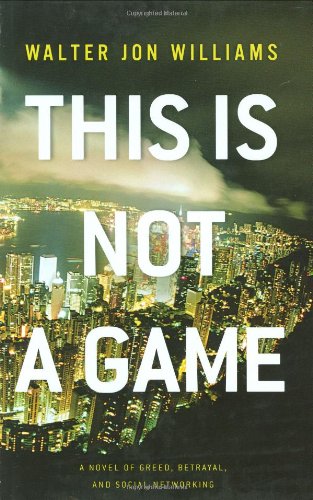Games People Play

SF is about the future, right? It's about gadgets and rockets and talking squid. At least, if you listen to some folks, that's the way it works.
But people who are paying attention know that SF is much more than that. Witness the recent spate of stories that take place practically in the present. I don't mean stories that were overtaken by events, as William Gibson famously complained (and he wasn't talking about Jules Verne, either). I mean stories that were written to take place pretty much in the here-and-now. Earth, as we know it.
Science fiction is about the present, after all. The gadgets, the rockets, and the talking squid, may add interesting flavor to the story ("Mmmmh! Talking squid!" ~ Homer Simpson), but the point of the story is the present.
Walter Jon Williams's story This is Not a Game is a prime example of how it's done. Dagmar Shaw finds herself marooned in Indonesia, amids riots and economic mayhem, as something appears to have happened to the Indonesian rupiah. Dagmar is a game master of something called an Alternate Reality Game. She uses her access to large numbers of inventive people to help her escape from her predicament, and soon is safe, back in the USA.
But now her friend Austin is assassinated, right in front of her eyes. Again, her game participants help her find the killer, but there is no clue for the reason of her friend's death. She supposes the killer might have been after her boss, Charlie, also a former friend, who looks somewhat similar to Austin, and who starts to act increasingly erratic.
Dagmar continues to crowdsource her mystery, and she soon guesses the reason for Charlie's behavior. When she confronts him, he confesses, and they begin to conspire together. However, Dagmar has not counted on yet another complication.
Dagmar is a likable character. Williams does a good job with her, her motivations, and her inner life. You'll be glad you met her, and you'll be cheering for her when the going gets tough.
Altogether, the story is a competent and enjoyable mystery or thriller (depending on how you define your genres). What makes it SF?
Williams has described a world as it might be, with only a small step into the future. It's no different than others have done. H. G. Wells's invading Martians meet the Earth of the day. George R. Stewart describes the world of the late forties that might exist but for one cataclysmic epidemic (Earth Abides, 1949). Kurt Vonnegut supposes what the world of the sixties might look like in the aftermath of a technological apocalypse (Cat's Cradle, 1963).
Some of us fans might feel dissatisfied. Is SF becoming normative literature? Is our ghetto being gentrified?
Personally, I wouldn't worry about it. There'll always be plenty of stories that just won't fit on the "General Fiction" shelves at the book store, even if some of them might make good cross-over candidates. Meanwhile, take a shot at this one. Without the talking squid it isn't terribly weird, but it will keep you glued to the pages.

0 Comments:
Post a Comment
<< Home